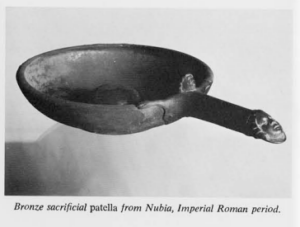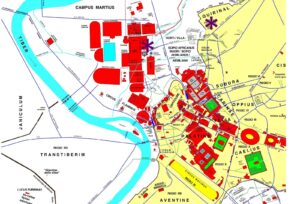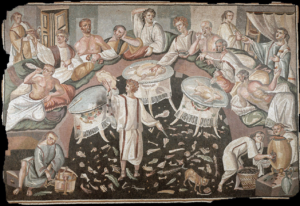Martial, Epigrams 5.78, 10.48
translation and commentary by Teddy Allen-Myers (’24)
In both Epigrams, Martial is inviting a friend to dinner. Both poems follow a general format. In the first half or so of each epigram, Martial lists out the foods that will be served at the dinner he’s hosting. In the second half or so, he talks about why the dinner conversation and entertainment will be worthwhile. A common theme throughout his poems is how he tries to describe how much he lacks wealth. Although Martial owned multiple properties throughout Italy and slaves as well, he nonetheless tries to present himself as a humble common man. If only he knew the struggles of being a broke college student. On another note, most of the produce that Martial mentions in these poems was likely not grown by him since he sucked at gardening (Watts 2015, 78).
Translation
Epigram 5.78:
If you labor for a sad home meal, Toranius, you can be hungry with me. If you are used to a drink before the meal, it won’t be lacking for you, cheap Cappadocian lettuce and pungent leek, Tunny fish will hide in sliced eggs. [5] Green broccoli which was just now relinquished from a cold garden will be placed on a black patella, to be held by greasy fingers, and blood pudding pressing on white porridge, and a pale bean with red bacon. [10] If you wish for a gift of dessert, shrivelling grapes will be offered to you and pears which carry the name of Syria, and what skilled Naples created: chestnuts toasted by slow warmth: [15] the wine you will make good by drinking it. After all this, if by chance Bacchus will move a hunger, as he’s in the habit of doing, noble olives will aid you, Picenian olives which were just carried on the branch, [20] and hot chickpea and tepid lupine. This is a small little dinner—who is able to deny?— but you will produce and hear nothing fictitious and you will recline placidly with your own natural look; Neither will the house master read a dense volume [25] nor will girls from impudent Cadiz shake lustful loins, itching without end, by learned tremor; but the flute of little Condylus will be played which may neither be heavy nor rude. [30] Such is the small dinner. You will follow Claudia. Whom do you wish to be before us?
Epigram 10.48:
The crowd of the Pharian heifer announces the eighth hour, and the javelin-armed cohort already returns and takes its place. This hour tempers the baths, the prior hour releases excessive steam, and the sixth hour is kept warm by immoderate Nero. The guests are Stella, Nepos, Canius, Cerialis, and Flaccus, are you coming? [5] The sigma couch has room for seven; we are six, so add Lupus. The wife of the farm overseer has brought mallows for unburdening the stomach and various resources which the garden has, in which there is sitting lettuce and cut leek, nor is belch-inducing mint lacking, nor the salacious herb; [10] Sliced eggs will circle around bitter cheap mackerel, and there will be sow’s udder soaked in the brine of tunny fish. In these foods is the appetizer course; the little dinner course will be placed on one table: a young goat, snatched from the mouth of an inhuman wolf, and morsels which may not require the iron knife of the server, [15] and the bean of craftsmen and crude broccoli; a chicken and a ham already already a survivor of three meals will be added to these. For dessert I will give ripe apples, wine without impurity from a Nomentan flask, which was three years old when Frontinus was consul for the second time. [20] Jokes will come without gall nor in the morning will be feared the freedom of speech from last night and nothing you may wish to have kept silent: my banquet guest may speak about green and blue, nor will our cups make anyone guilty.
Commentary
(7) Patella: The patella could refer to either a platter or a pan for cooking. It was a rounded dish with a handle attached to it. The patella has a strong resemblance to a modern frying pan although the material for patellas were often clay or bronze and sometimes silver (Matthews 1969, 33-34).

Roman patella (Matthews 1969, 32).
(9) Blood Pudding: Despite the name, there is actually no blood present in Apicius’ recipe for blood pudding (also known as blood sausage) located in the 60th recipe of the 2nd De Re Coquinaria. The recipe is as follows: “Botellum is made of hard boiled yolks of egg chopped pignolia nuts, onion and leeks, raw ground pine, fine pepper, stuff in casings and cook in broth and wine” (Hill 1936, 69).
(12) Shrivelling Grapes: Grapes that were not completely ripe when the vineyard was getting picked would get left for later and would end up being sweeter than normal (Howell 1995, 159).
(18) Bacchus: Bacchus was the Roman god of wine. He was one of Zeus’s sons and considered by Silenius, the god of beer and drinking, to be a mentor (Oliver, Dornbusch, and Colicchio 2011). In the context of this poem, Bacchus is like a term used to mean “wine” which causes them to be more hungry.
(20) Picenian Olives: Olives from Picenum were extremely popular and reached their peak in popularity in Italy during the 1st century CE, when Martial was alive (Van Limbergen 2016, 175).
(24) Vultu tuo: “The meaning of this phrase is disputed, with some scholars reading “Wearing your own face” instead of “with your own natural look”. Here I follow Anonymous 1897.
(26) Cadiz’s dancing girls: The Dancing Girls of Cadiz were enslaved girls from Cadiz who were often hired out to dance elsewhere, including Rome. The dancing these girls would do was likely similar to what we know as belly dancing today. Although these dancing girls were catered to all ends of the Roman class spectrum, it is believed that the lack of dancing girls from Cadiz in this poem is supposed to suggest a lack of wealth (Fear 1991, 75-76).
Martial 10.48:
(1) Pharian Heifer: The Pharian heifer refers to the goddess Isis (also known to Romans as Io), associated with the Egyptian island of Pharos, where the famous lighthouse of Alexandria was located. Zeus lusted after Isis/Io and transformed her into the shape of a cow to hide her from his jealous wife, Hera (Hammond 1970, 549). In the context of this poem, the term is used by Martial to contemptuously describe the worshippers at the temple of Isis who lived down the Quirinal hill from his house.

Asterisks added to show the approximate locations of Martial’s house on the Quirinal Hill and the Temple of Isis in the Campus Martius (Häuber 2017, 63).
(2) My translation comes from Charlotte Francis’ commentary of the poem which states that the line can be paraphrased as “et pilata cohors iam et rediit et subiit” (Francis 2006, 311)
(3-4) Bathing Rituals: There was supposedly an ideal time to bathe before a meal. As the temperature of Nero’s baths (Nero was the name of the emperor at the time) changed by the hour and Martial’s place was located right by the baths, Martial could gauge the optimal time to take a bath before eating by the temperature of Nero’s baths (Francis 2006, 312).
(6) Sigma Couch: The Sigma couch was usually a curved couch in a semicircular shape. Banquet guests would recline on this couch that surrounded the dinner table. Apparently, these couches became extremely popular around the 5th century, a good few centuries after martial’s time (Dunbabin 1991, 128-130).

Mosaic from Château de Boudry, a 5th-century depiction of a sigma couch in use.
(12) Sow’s Udder: Sow’s udder was considered a Roman delicacy, and according to the Edict of Diocletian published in 301 AD, sow’s udder along with other cuts of pork was the most expensive of any meat and costed twice the price of lamb (Essig 2015). According to the 257th recipe of Apicius’ 7th De Re Coquinaria, here’s how you could cook sow’s udder: “Sow’s udder or belly with the paps on it is prepared in this manner: the belly boil, tie it together with reeds, sprinkle with salt and place it in the oven, or, start roasting on the gridiron. Crush pepper, lovage, with broth, pure wine, adding raisin wine to taste, thicken the sauce with roux and pour it over the roast” (Hill 1936, 161).
(17) Tribus Superstes: I got the idea that Tribus Superstes meant “survivor of three meals” from Francis’ commentary which states that “added to this is the ham which has already lasted three dinners” (Francis 2006, 318).
(19) Nomentan Wine: Martial had an estate in Nomentum. It is believed that the wine didn’t come from a vineyard owned by Martial but was bought from there (Leary 1999, 34). According to Leary, Nomentan wine was “neither too sweet nor too light, and it was ready for drinking in five years” and that “although not a vintage of the highest order… it was nonetheless well regarded” (Leary 1999, 34).
(23) Green and Blue: The colors green and blue refer to the factions in chariot racing. There were four factions: the Blues, the Greens, the Reds, and the Whites. Domitian also added the Purples and the Golds, but those factions didn’t last long. Overall, the Greens and the Blue were the most popular factions which is probably why Martial mentions these two factions specifically (BCcampus).
Sources
Matthews, Kenneth. 1969. “Scutella, Patella, Paterna, Patina: A Study of Roman Dinnerware.” Expedition Magazine 11, no. 4 (Summer): 30-42. https://www.penn.museum/sites/expedition/scutella-patella-paterna-patina/
Oliver, Garrett, Horst Dornbusch, and Tom Colicchio. “Bacchus.” In The Oxford Companion to Beer. Oxford: Oxford University Press, 2011. https://www.oxfordreference.com/view/10.1093/acref/9780195367133.001.0001/acref-9780195367133-e-102.
Fear, A.T. 1991. “The Dancing Girls of Cadiz.” Greece & Rome 38, no. 1 (April): 75-79. https://www.jstor.org/stable/643110
Anonymous Translator. 1897. Bohn’s Classical Library. https://www.tertullian.org/fathers/martial_epigrams_book05.htm
Howell, Peter. 1995. Martial: Epigrams V: edited with an introduction, translation & commentary by Peter Howell. Warminster: Aris & Phillips.
Hammond, N.G.L. 1970. The Oxford Classical Dictionary. Oxford: Clarendon Press. https://archive.org/details/oxfordclassicald00hamm/page/548/mode/2up
Häuber, Chrystina. 2017. Augustus and the Campus Martius in Rome: the Emperorʹs Rôle as Pharaoh of Egypt and Julius Caesarʹs Calendar Reform; the Montecitorio Obelisk, the Meridian Line, the Ara Pacis, and the Mausoleum Augusti. (München: Hochschule München). https://fortvna-research.org/FORTVNA/FORTVNA_PAPERS_Vol2.pdf
Francis, Charlotte. 2006. “Martial Epigrammata Book X A Commentary by Charlotte Francis.” PhD diss., University of Otago.
Dunbabin, Katherine M.D. 1991. “Triclinium and Stibadium” In Dining in a Classical Context, edited by Willam J. Slater, 121-148. Ann Arbor: The University of Michigan Press.
Château de Boudry “Mosaïque d’un symposium figurant un asarotos oikos (au sol non balayé).” Accessed April 23, 2023. https://chateaudeboudry.ch/le-musee/les-collections/pieces-principales/#mosaique
Essig, Mark. 2015. Excerpt From “Lesser Beasts: A Snout-to-Tail History of the Humble Pig.” In Weinzweig, Ari. 2016. “Country’s Leading Hog Historian Comes to Camp Bacon®.” Zingermann’s Community of Businesses, June 2, 2016. https://www.zingermanscommunity.com/2016/06/countrys-leading-hog-historian-comes-to-camp-bacon/
Hill, Walter M. 1936. Apicius. Cookery and Dining in Imperial Rome Chicago: Walter M. Hill. https://penelope.uchicago.edu/Thayer/E/Roman/Texts/Apicius/Review*.html
Leary, T.J. 1999. “Martial’s Christmas Winelist.” Greece & Rome 46, no. 1 (April): 34-41. https://www.jstor.org/stable/643035
BCcampus. “The Charioteers, the Teams and the Horses.” Accessed May 4, 2024. https://pressbooks.bccampus.ca/spectaclesintheromanworldsourcebook/chapter/the-charioteers-the-teams-and-the-horses/#:~:text=There%20were%20four%20racing%20factions,did%20not%20have%20last%20long.
Van Limbergen, Dimitri. 2016. “A Note on olives and olive oil from Picenum (Marche, Northern Abruzzo). An obscured food product within the economy of central Adriatic Italy in Roman times?” Picus 36, 171-182. https://studiumanistici.unimc.it/it/ricerca/riviste/picus/picus-xxxi-xxxvi-dal-2011-al-2016/09VANLIMBERG.pdf
Watts, Tracy. 2015. “Martial’s farm in the window: the case for urban agriculture in ancient Rome.” Hermathena, no. 198 (Summer): 53-90. https://www.jstor.org/stable/26671606